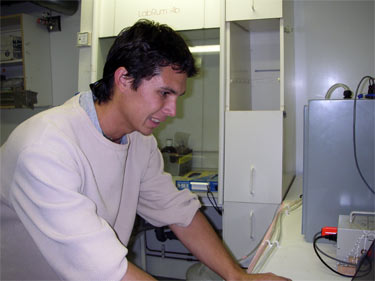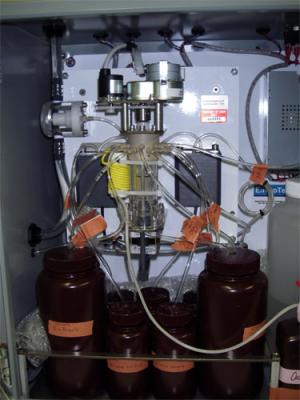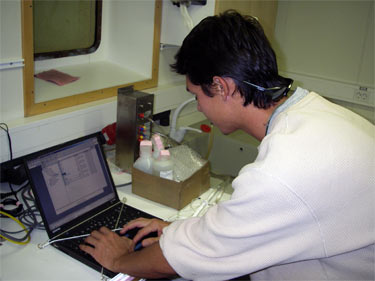Antarctic Science Career Options – Research Technician
So how about this for your first job straight out of college? Just this past summer Cooper Guest graduated from University of Hawaii in Hilo with a bachelor's degree in marine science and a minor in chemistry. He immediately applied to work for Raytheon Polar Services – the company that is responsible for coordinating the entire US Antarctic Program and was immediately offered a position on our Oden expedition.
 Cooper Doing Lab Work
Cooper Doing Lab Work
His job on board is to operate and maintain an electronic seawater nutrient analysis device on behalf of research scientist Scott Gallagher from the Woods Hole Institute at Cape Cod. The analyzer uses seawater pumped through the ship to the lab and runs tests looking at the concentration of various food sources for phyto and zoo-plankton such as nitrates, nitrites, phosphates, and iron. It is a brand new piece of analysis equipment produced just for this mission by Envirotech from Chesapeake, Virginia
 Nutrient Analyzer
Nutrient Analyzer
When I asked Cooper what young students should if they were considering following in his career footsteps, he immediately got excited about all the possibilities that exist for high school and college students to do summer research projects. Whether it's the Semester at Sea program, or a volunteer assignment in a local college or industry research lab – he's certain that it was all of the time he volunteered helping his professors in college with their research that gave him the necessary skills to hop right into his current position. He also recommended taking all the science and math that you can – his job involves lots of both and even some serious computer work and engineering.
 Cooper Analyzing Data
Cooper Analyzing Data
Sounds like this trip is just the beginning for him – since Raytheon runs all kinds of land and sea based research projects year-round in Antarctica, he probably will have many other opportunities to visit Antarctica supporting other science projects at the Pole. We're sure excited to have him with us for the voyage.

